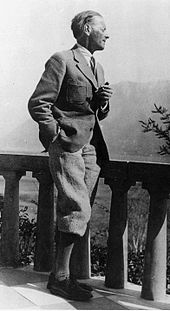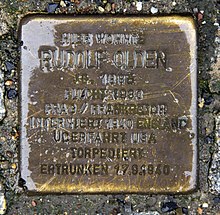Rudolf Olden


Rudolf Olden (born January 14, 1885 in Stettin ; † September 18, 1940 in the Atlantic) was a German journalist and lawyer . He was a public figure in the Weimar Republic .
Life
Rudolf Olden was the son of the writer Johann Oppenheim (since 1891 Hans Olden ) and his wife, the actress Rosa Stein. The journalist and writer Balder Olden was his older brother; the economist Heinrich Bernhard Oppenheim and the painter Moritz Daniel Oppenheim were distant relatives.
After Olden successfully graduated from high school in his hometown, he aspired to a career in the military. He began as a volunteer with the Leib-Dragoon Regiment (2nd Grand Ducal Hessian) No. 24 in Darmstadt, took part in the occupation of Belgium and the invasion of France and came to the Russian front in spring 1915. Multiple awards, Olden experienced the end of the First World War as a first lieutenant . His experiences in the war completely changed his political attitudes. He left the army and began working as a journalist for the pacifist magazine Der Friede in Vienna . At the same time, Olden also became a member of the editorial team for Neuen Tag .
In 1920 Olden married the psychoanalyst Marie-Christine Fournier , divorced Furtwängler, daughter of the Viennese historian Prof. August Fournier . During this time, Olden u. a. with Arnold Höllriegel , Benno Karpeles , Egon Erwin Kisch and Alfred Polgar . After the bankruptcy of the newspaper Der neue Tag , Olden founded the journal Er und Sie together with the writer Hugo Bettauer . This periodical had the subtitle "Weekly for Lifestyle and Eroticism" and caused controversial discussions from the first edition.
1926 Olden from Berlin publisher was Theodor Wolff of Berlin to the office of the Berliner Tageblatt brought. Here, Olden soon caused a sensation with his editorials on daily political events and soon became editor-in-chief as deputy of Theodor Wolff. In Berlin, Olden also married the fashion designer Isolde Boguth .
As one of the most famous journalists, Olden u. a. also for the magazines Die Menschenrechte , Das Tage-Buch and Die Weltbühne .
Olden was also admitted to the bar in 1926 and he practiced this profession for a few years. In 1931 the League for Human Rights appointed him to its board. When Kurt Tucholsky published the phrase “ soldiers are murderers ” in “Der Weltbühne” on August 4, 1931 , the responsible editor-in-chief Carl von Ossietzky was charged with “insulting the Reichswehr” ( Weltbühne trial ). Olden took over his defense and obtained an acquittal for Ossietzky.
On February 17, 1933, Olden spoke at a meeting of the Association of German Writers and invited the Free Word to the Berlin “ Krollper ” for the congress that began two days later ; almost 1500 artists and scientists (but also politicians) accepted this invitation. In 1933, Olden married the psychoanalyst Ika Halpern (* 1908) for the third time; with her he had a daughter, Mary Elizabeth Olden, born in 1938, called "Kutzi".
On the day after the Reichstag fire , Olden - warned by friends - escaped arrest just in time. He went to Prague , where he anonymously published the essay Hitler the Conqueror - The Unmasking of a Legend the following year . Olden went from Prague to Paris , where in 1934 his widely acclaimed documentation "Black Book on the Situation of Jews in Germany" was published. In the same year Olden took over the management of the newspaper Das Reich in Saarbrücken and was very involved in the fight against the annexation of the Saarland to the " Third Reich ".
During this time, Olden could only publish in exile newspapers, such as B. the new day book , Pariser Tageblatt or the collection . On the basis of some of these articles, the diplomat Gilbert Murray invited Olden to give lectures on German history and domestic politics in London and Oxford .
The German PEN Club in Exile found an extremely conscientious secretary in Olden from 1934 (without being elected or appointed). As such, he made contacts, obtained visas and provided material support for many colleagues. Through Olden's mediation, Robert Musil and his wife were able to emigrate to Switzerland with the support of the Aid Organization for German Scholars .
In 1935 Olden published a biography of Hitler in German at IDO Verlag, Amsterdam, which was published in English in 1936 under the title Hitler the Pawn .
In 1936, Olden was stripped of its German citizenship . As a stateless person, Olden continued his work as secretary of the PEN in London and campaigned for the award of the Nobel Peace Prize for his friend Carl von Ossietzky, who had been imprisoned by the National Socialists. When Great Britain entered the war , he was interned; seriously ill, Olden took a position as a lecturer at the New School for Social Research in New York in 1940 . The Olden couple had already brought their daughter Mary Elizabeth to safety on a children's transport to Canada. The British passenger steamer City of Benares , which was supposed to bring Olden and his wife to Canada, was sunk in the Atlantic on September 18, 1940 by the German submarine U 48 . 248 people died in the sinking, including Olden and his wife.
"He was a German Liberal of the best sort, rather more pugnacious than the average British Liberal, because he had more to fight against."
Works
Works in chronological order
- Stresemann. A biography. Rowohlt, Berlin 1929.
- Prophets in German crisis. The wonderful or the enchanted. A collection. Edited by Rudolf Olden. Rowohlt, Berlin 1932.
- The black book. Facts and documents. The situation of the Jews in Germany in 1933. Comité des Délégations Juives, Paris 1934.
- Hitler the Conqueror. Unmasking a legend. Fischer, Frankfurt / M. 1984, ISBN 3-596-25185-0 (repr. Of the Amsterdam 1935 edition).
- Hindenburg or the spirit of the Prussian army. Gerstenberg, Hildesheim 1982, ISBN 3-8067-0911-4 (repr. Of the Paris 1935 edition).
- The history of freedom in Germany. Verlag Das Andere Deutschland, 1948.
Autobiographical writings
- Rudolf and Ika Olden: Germany lies in deep darkness. Expelled by Hitler, one year German emigration. Metropol Verlag, Berlin 1994, ISBN 3-926893-20-6 .
Letters
- Rudolf Olden, Peter Olden: Letters from the years 1935–1936. Edited by Charmian Brinson and Marian Malet. European Ideas Publishing House, Berlin 1987.
Exhibitions
- 1981: So many books, so many bans. Exhibition "The German PEN Club in Exile 1933–1948". Booksellers Association, Frankfurt / M. 1981, ISBN 3-7657-1039-3 .
- 2010: Rudolf Olden: Journalist against Hitler - Attorney of the Republic. German National Library, Frankfurt am Main.
literature
- Ingo Müller: Olden, Rudolf. In: New German Biography (NDB). Volume 19, Duncker & Humblot, Berlin 1999, ISBN 3-428-00200-8 , p. 505 f. ( Digitized version ).
- German National Library : Exhibition catalog Rudolf Olden: Journalist against Hitler - Lawyer of the Republic. Frankfurt am Main 2010 ISBN 978-3-941113-23-7 .
- Ingo Müller : Rudolf Olden (1885-1940). Journalist and lawyer of the republic. In: Editorial “ Critical Justice ” (ed.): Controversial jurists. Another tradition. Baden-Baden 1988, p. 180.
- Sebastian Schäfer: Rudolf Olden - journalist and pacifist. From the apolitical to the pan-European: moral renewal under the sign of modern cultural criticism (= Weimar writings on the republic. 8). Steiner. Stuttgart 2019, ISBN 978-3-515-12393-8 .
Web links
- Literature by and about Rudolf Olden in the catalog of the German National Library
- Rudolf Olden in the Central Directory of Digitized Prints (zvdd)
- Part of Rudolf Olden's estate in the German Exile Archive of the German National Library
Individual evidence
- ^ Raya Cohen: Black Book. In: Dan Diner (Ed.): Encyclopedia of Jewish History and Culture (EJGK). Volume 5: Pr-Sy. Metzler, Stuttgart / Weimar 2014, ISBN 978-3-476-02505-0 , pp. 400–402.
| personal data | |
|---|---|
| SURNAME | Olden, Rudolf |
| BRIEF DESCRIPTION | German lawyer and journalist |
| DATE OF BIRTH | January 14, 1885 |
| PLACE OF BIRTH | Szczecin |
| DATE OF DEATH | September 18, 1940 |
| Place of death | Atlantic |

